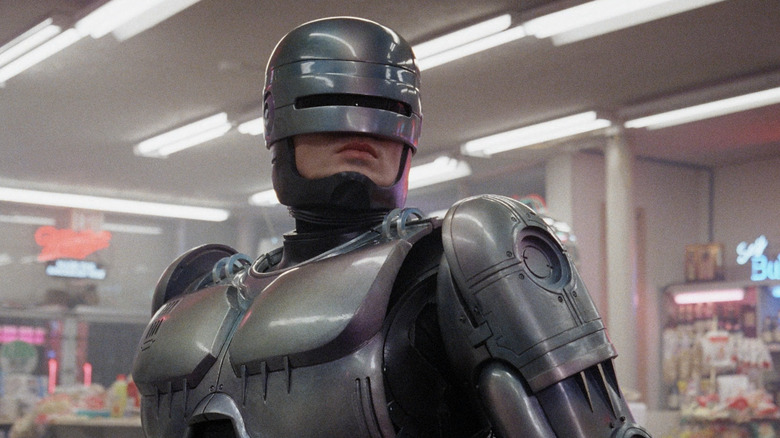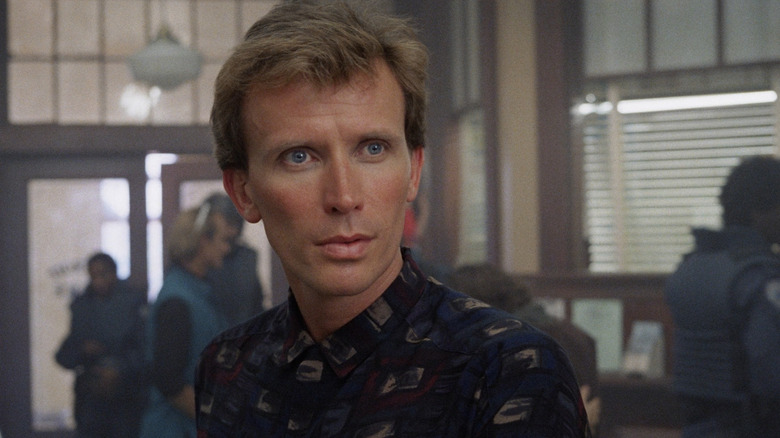The RoboCop Script Spent Some Time In Paul Verhoeven's Trash Can
The original "RoboCop" was only Paul Verhoeven's second English-language film, but it brought the Dutch director a new level of mainstream success in the U.S. market as his style shifted more toward violent sci-fi blockbusters. When Verhoeven first read Edward Neumeier and Michael Miner's "RoboCop" script, however, he was not so impressed with the concept. In fact, he threw the script in the trash.
"RoboCop" stars Peter Weller as Alex Murphy, a police officer in a dystopian Detroit who suffers torture and death at the hands of a gang, only to be resurrected as a cyborg, "part man, part machine, all cop." Omni Consumer Products (OCP), a mega-corporation that has taken over the police in the appropriately nicknamed Motor City, programs RoboCop with the directives of serving the public trust, protecting the innocent, and upholding the law. He also has a fourth classified directive, whereby "any attempt to arrest a senior officer of OCP results in shutdown."
Released in 1987, "RoboCop" functions on numerous levels, including as a campy critique of Reaganomics, the "Greed is good" culture (further immortalized in Oliver Stone's "Wall Street," which hit theaters the same year.) Verhoeven's filmography up to that point included dramas and thrillers tinged with romance. There was nothing to outwardly indicate that he was the best choice for "RoboCop."
Verhoeven himself didn't think he was such a good directorial candidate, either. Speaking to SFX Magazine (via its sister site, GamesRadar), he explained:
"I read about 15 pages and threw it away. ['RoboCop'] was so far away from the films I'd made. They were much more based in reality and certainly not science fiction. That subtitle, 'the future of law enforcement', seemed completely alien to me."
RoboCop: The Unlikely Christ Figure
It was Verhoeven's wife who convinced him that there was something in "RoboCop" worth re-examining and maybe even filming. As he put it:
"She read it in a completely different way: she felt there were elements that weren't so far away from me, like [Murphy] losing his past, and the philosophy of losing your memory. ... Even my films in Holland, if they were about a war, none of them were action movies. I was more interested in the philosophical underpinnings of the script. I saw RoboCop a bit like a futuristic Jesus."
Losing one's memory is a subject Verhoeven would return to in his next movie, "Total Recall." And while a cyborg like RoboCop might seem like an unlikely Christ figure, he is perhaps no more unlikely than a superhero or alien such as Superman or E.T. the Extra-Terrestial, both of whom came to Earth in Christlike trappings and who thrived alongside RoboCop at the box office in the 1980s.
Among other things, "RoboCop" does notably contain a scene where the hero walks on water, as seen in the clip above. Though not religious, Verhoeven was also a member of the Jesus Seminar, a group of biblical scholars and laymen who sought to arrive at a consensus about the historical Jesus and who were featured in the 2000 ABC News program, "The Search for Jesus," hosted by Peter Jennings.
Alex Murphy Died for Your Sins
Neumeier later noted (via CNN) how prescient "RoboCop" turned out to be as a metaphor of "industrial decline in America," with the present, real-life Detroit coming to resemble the movie's future, fictional Detroit in some ways. In 2012, while "RoboCop" was celebrating its 25th anniversary, Forbes named Detroit the most dangerous U.S. city. The following year, the nation's automotive center filed the biggest municipal bankruptcy in U.S. history.
Coming from a European perspective, Verhoeven was not necessarily wired into the politics of private prisons and gentrification in U.S. cities the way Neumeier was. While relating the oral history of "RoboCop" to Esquire in 2014, the year of the Joel Kinnaman-led "RoboCop" remake, Verhoeven again compared RoboCop to Jesus, drawing a direct parallel between Murphy's death and the crucifixion. He said:
"The violence in ['RoboCop'] is amplified because I thought it had to do with Jesus. Murphy, when he's still Murphy, is crucified. That's why the killing of Murphy is extremely violent, especially in the original version. I thought that I could move from there into his resurrection. RoboCop's an American Jesus. I don't believe in the resurrection of Jesus in any way. But I can see the value of that idea, the purity of that idea. So from an artistic point of view, it's absolutely true."
Next time you watch "RoboCop," remember: Alex Murphy died for your sins. As for Verhoeven, he's still producing edgy fare wrapped in religious wool. In 2021, he traded violence for sex with "Benadetta," a lesbian nun drama.

